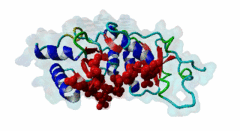LIG_BRCT_BRCA1_2
| Accession: | |
|---|---|
| Functional site class: | BRCT phosphopeptide ligands |
| Functional site description: | BRCT domains are protein modules mainly found in Eukaryota. BRCT domains are present in proteins that are associated with DNA damage response. They recognize and bind specific phosphorylated serine (pS) sequences. This phospho-protein mediated interaction of the BRCT domain has a central role in cell-cycle check point and DNA repair functions. |
| ELMs with same func. site: | LIG_BRCT_BRCA1_1 LIG_BRCT_BRCA1_2 LIG_BRCT_MDC1_1 |
| ELM Description: | The LIG_BRCT_BRCA1_2 motif binds with high affinity to the BRCT domain of BRCA1. The motif has the consensus sequence S..F.K and these residues are specially recognized by the binding pocket in the BRCT domains. The lower affinity motif lacks the lysine residue (S..F). |
| Pattern: | .(S)..F.K |
| Pattern Probability: | 0.0001169 |
| Present in taxon: | Eukaryota |
| Interaction Domain: |
BRCT (PF00533)
BRCA1 C Terminus (BRCT) domain
(Stochiometry: 1 : 1)
|
BRCT domains were first identified in and named after the breast cancer susceptibility protein BRCA1 (Zhang,1999). They have alpha/beta structures that occur singly or as multiple repeats. BRCT domains are 80-100 amino acid in length and function as phosphopeptide ligands (Clapperton,2004). They are found in nuclear proteins that are typically associated with cell cycle checkpoint functions responsive to DNA damage (Glover,2004). An unusual feature of paired BRCT motifs is that the phosphopeptides bind across the domain-domain interface (Clapperton,2004). Available data when this entry was prepared suggest that BRCTs may bind exclusively to phosphoserine peptides. By contrast FHA domains, which are often found in a similar functional context, recognise phosphothreonine peptides (LIG_FHA_1). Many of the BRCT ligands are likely to be at pSQ motifs phosphorylated by the checkpoint kinases, ATM, ATR, DNA-PK (Glover,2004). BRCA1-binding motifs are S..F.K (high affinity) or S..F (lower affinity) (Clapperton,2004). Metazoa MDC1 binds histone H2AX C-terminal S..Y$ motifs (Lee,2005), which may be S..F$ in plants and S..L$ in Fungi, but experimental evidence has been lacking. Also, a poorly characterised motif binding the TopBP1 BRCT may match the pattern S.II but more data is needed (Liu,2003). Since consensus motifs have so far been defined for just a few BRCT domains, the range of different binding motif patterns could be quite large. |
-
Cell signaling. The BRCT domain: signaling with friends?
Caldecott KW
Science 2003 Oct 24; 302 (5645), 579-80
PMID: 14576410
-
BRCT repeats as phosphopeptide-binding modules involved in protein
targeting.
Manke IA, Lowery DM, Nguyen A, Yaffe MB
Science 2003 Oct 24; 302 (5645), 636-9
PMID: 14576432
-
The BRCT domain is a phospho-protein binding domain.
Yu X, Chini CC, He M, Mer G, Chen J
Science 2003 Oct 24; 302 (5645), 639-42
PMID: 14576433
-
Phosphopeptide binding specificities of BRCA1 COOH-terminal (BRCT)
domains.
Rodriguez M, Yu X, Chen J, Songyang Z
J Biol Chem 2003 Dec 26; 278 (52), 52914-8
PMID: 14578343
-
Structure and mechanism of BRCA1 BRCT domain recognition of phosphorylated
BACH1 with implications for cancer.
Clapperton JA, Manke IA, Lowery DM, Ho T, Haire LF, Yaffe MB, Smerdon SJ
Nat Struct Mol Biol 2004 Jun; 11 (6), 512-8
PMID: 15133502
-
Structural basis of phosphopeptide recognition by the BRCT domain of
BRCA1.
Williams RS, Lee MS, Hau DD, Glover JN
Nat Struct Mol Biol 2004 Jun; 11 (6), 519-25
PMID: 15133503
-
Interactions between BRCT repeats and phosphoproteins: tangled up in two.
Glover JN, Williams RS, Lee MS
Trends Biochem Sci 2004 Nov; 29 (11), 579-85
PMID: 15501676
-
Structural basis for cell cycle checkpoint control by the BRCA1-CtIP
complex.
Varma AK, Brown RS, Birrane G, Ladias JA
Biochemistry 2005 Aug 23; 44 (33), 10941-6
PMID: 16101277
(click table headers for sorting; Notes column: =Number of Switches, =Number of Interactions)
| Acc., Gene-, Name | Start | End | Subsequence | Logic | #Ev. | Organism | Notes |
|---|---|---|---|---|---|---|---|
| Q9BX63 BRIP1 FANCJ_HUMAN |
989 | 995 | IVISRSTSPTFNKQTKRVSW | TP | 4 | Homo sapiens (Human) |
Please cite:
ELM-the Eukaryotic Linear Motif resource-2024 update.
(PMID:37962385)
ELM data can be downloaded & distributed for non-commercial use according to the ELM Software License Agreement
ELM data can be downloaded & distributed for non-commercial use according to the ELM Software License Agreement

